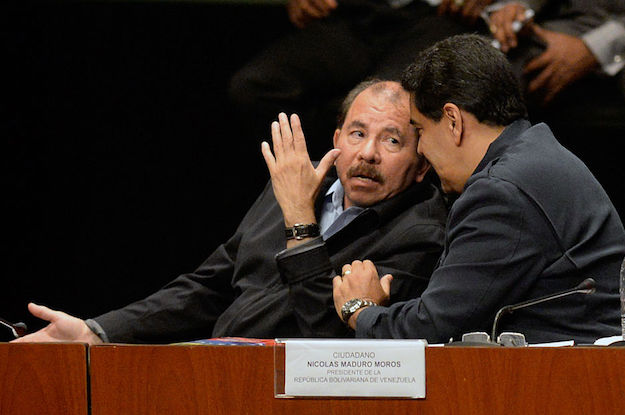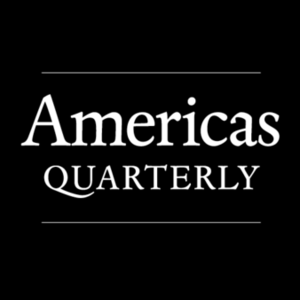
Nicaraguan President Daniel Ortega (L) speaks with Venezuelan President Nicolas Maduro during the commemoration of the third anniversary of late Venezuelan President Hugo Chavez’s death at the Teresa Carreno Theater in Caracas on March 5, 2016. (FEDERICO PARRA/AFP/Getty Images)
BY OLIVER STUENKEL | AUGUST 30, 2017
Leaders on both sides of the ideological spectrum are tempted by authoritarianism.
The first sign of trouble on my recent research trip to Nicaragua was that almost nobody would speak to me about President Daniel Ortega on the record.
“I just don’t want any problems with Ortega,” one person said. Félix Maradiaga, a social entrepreneur from Managua, told me: “The government leaves you alone as long as you don’t speak out against them. If you do, they make your life uncomfortable.”
Sometimes the message is sent in a subtle manner, sometimes less so. On several recent occasions, troublesome academics visiting Nicaragua have been politely asked to take the next flight back home. In Maradiaga’s case, a colleague quit after a family member received threats from the police. His consulting firm lost clients who privately confessed they were being pressured to cut ties.
None of this comes as a surprise. Since November 2016, when Ortega was re-elected for a third consecutive term in a vote described as rigged by the opposition and many foreign governments (no international observers were allowed), the president has consolidated his power. Ortega now firmly controls all branches of government, including the courts. While holding on to traditional causes of his party such as better public health and education, the ruling Sandinista National Liberation Front has also embraced a pro-business and “family values” agenda, including strict anti-abortion laws.
This sophisticated strategy of co-optation – fueled until recently by lavish Venezuelan aid – has left the opposition divided and disorganized. Ortega’s major critics today are Sandinista stalwarts, who say the president has turned into just another strongman who seeks to establish a family dictatorship. His wife is vice president and de facto chief of staff, and several children occupy key positions in government. With the electoral route increasingly less of an option for an orderly transition, any post-Ortega scenario will be marked by an unpredictable power struggle. The president is 72 years old and rumors about his health are rampant in Managua.
There are some parallels to Venezuela’s former leader Hugo Chávez and President Evo Morales in Bolivia, both left-wing leaders who have been criticized for riding roughshod over constitutional constraints. But a closer analysis reveals that Ortega’s project has little to do with socialism or other left-wing ideals. Rather, it is becoming obvious that his style is increasingly similar to that of the Somoza dynasty, which ruled Nicaragua for decades – and that the Sandinista movement successfully unseated in 1979 after a bitter struggle. Just like the Somozas, Ortega is above all interested in holding on to power for as long as possible, without having to deal with the limitations constitutional democracy involves.
The case of Juan Orlando Hernández, president of neighboring Honduras, reveals similar difficulties in accepting checks and balances. Honduras’ constitution prohibits anyone who has exercised “executive power” from running for president again. After left-leaning former President Manuel Zelaya was ousted in a coup after seeking to organize a referendum on changing the constitution to allow for re-election, right-leaning Hernández adopted an authoritarian strategy to achieve the same goal. In a cunning move, he had an obedient Supreme Court declare void the part of the constitution prohibiting reelection – a so-called “indelible clause” that incumbents were legally prohibited to question.
Hernández could not have achieved this without an extreme concentration of power in the executive, and the electoral commission and the judiciary are seen as deferential to the president. Along the way, Luis Rubí, an inconvenient attorney general, was forced out. All this is precisely what the current constitution sought to avoid after the failed authoritarian experiments of the past. Just like Ortega in Nicaragua, Hernández skillfully built a coalition of powerful political actors, and benefitted from a divided and inept opposition.
While the state of democracy in Nicaragua is far worse – after all, despite Hernández’s tactics, an opposition victory in Honduras is still possible in theory – the crisis of democracy… continue reading here









